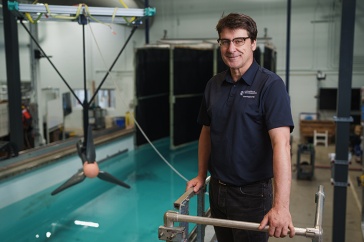Gun control. Abortion. The death penalty. You wouldn’t be alone in assuming that these are the hot-button issues that create the widest philosophical and political divide between Republicans and Democrats. But survey data released in May from UNH’s Carsey School of Public Policy yielded some surprising results: Democrats and Republicans are actually farther apart on their beliefs about climate change than on any of these other familiar political third rails.
“Climate change has become one of the most divisive questions we ask on the polls. That’s a change,” says report author Lawrence Hamilton, who is a professor of sociology and senior fellow at the Carsey School. A whopping 53 percentage points separate Democrats and Republicans on questions about whether and why climate change is happening.
Parse the data further, subdividing those who identify themselves with the Tea Party out of the general pool of Republicans, and the gap widens to 60 percent.
Hamilton tapped results of the UNH Survey Center’s 2014 Granite State Poll for his policy brief, called “Do You Trust Scientists About the Environment?” We do, said two-thirds of the 568 Granite Staters randomly selected for the poll.
Yet Tea Party Republicans stood out again with their responses: While 83 percent of Democrats and 60 percent of Republicans reported trusting scientists on the environment, just 28 percent of Tea Partiers did. As a Mother Jones magazine headline about the survey summarized, “Tea Party Members Really, Really Don’t Trust Scientists.”
“I’ve suspected for a while that this was happening, that climate change had become one of the main wedge issues of our time” says Hamilton. “There has been mobilized a lot of opposition to environmental protections over the past decades … people tend to see environmental topics through the light of their political prejudices.” With climate change as the driver, Hamilton surmises, the so-called science gap on a range of issues is widening.
This polarization stands in contrast to the bipartisan support of environmental issues in decades past, when Democrats and Republican reached across the aisle to pass landmark legislation like the Clean Air, Clean Water and Endangered Species acts.
While not a perfect match, New Hampshire is a reasonable proxy for the nation in these results, says Hamilton. If anything, he says, the evangelical nature of Tea Party members in the rest of the country might exacerbate the political divide that has policy implications for the nation.
“It’s really in gridlock right now,” Hamilton says. “You can’t move anywhere with this much polarization between Republicans and Democrats.”
Originally published by:
UNH Magazine, Fall 2014 Issue
-
Written By:
Beth Potier | UNH Marketing | beth.potier@unh.edu | 2-1566
















































